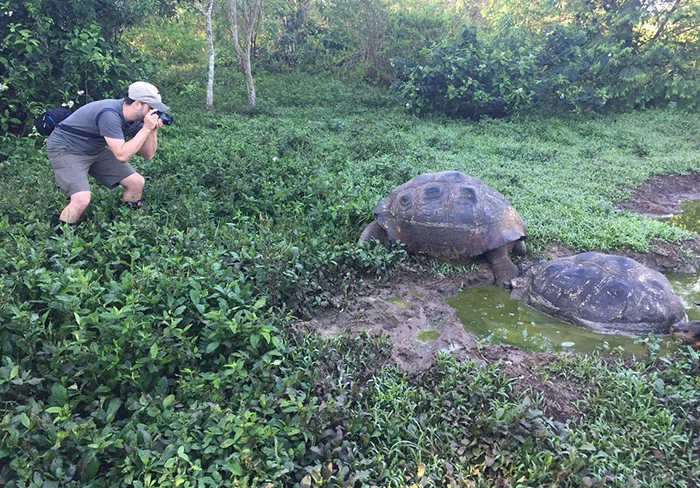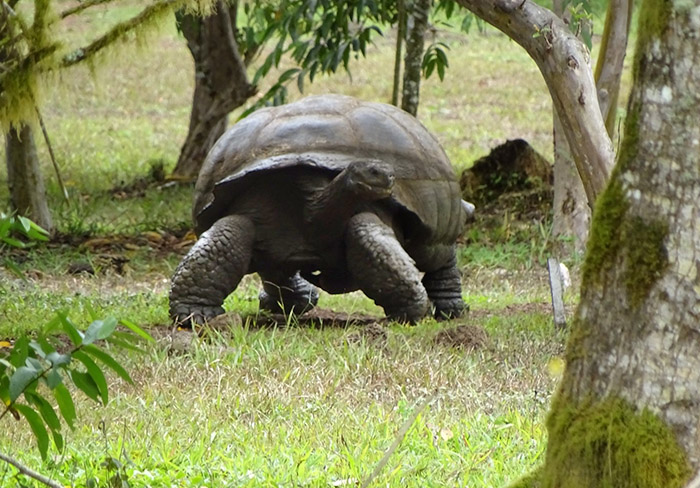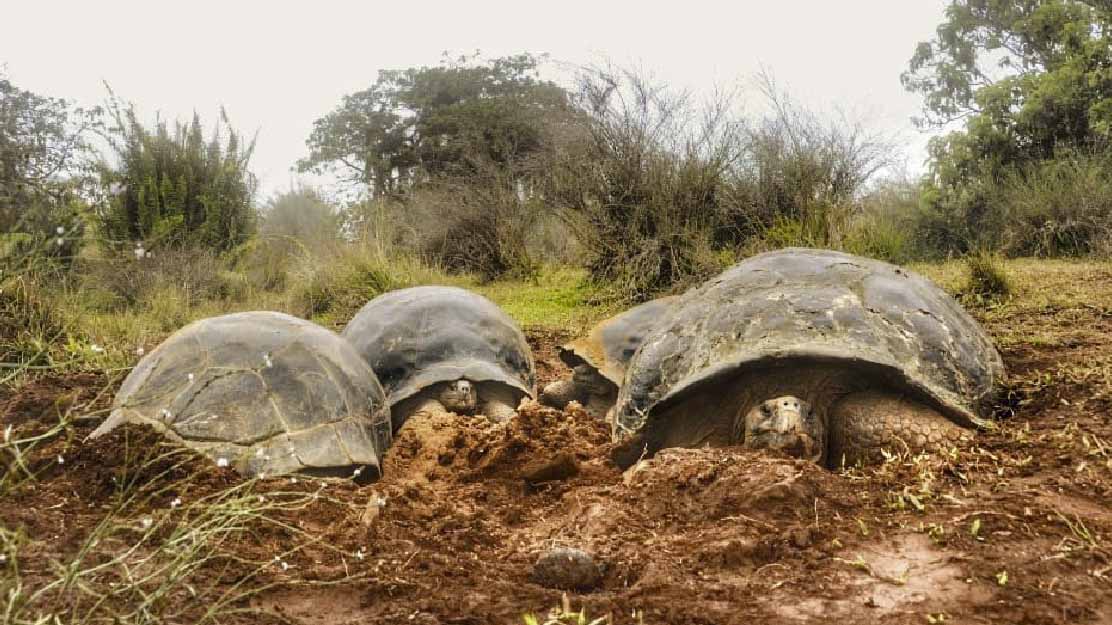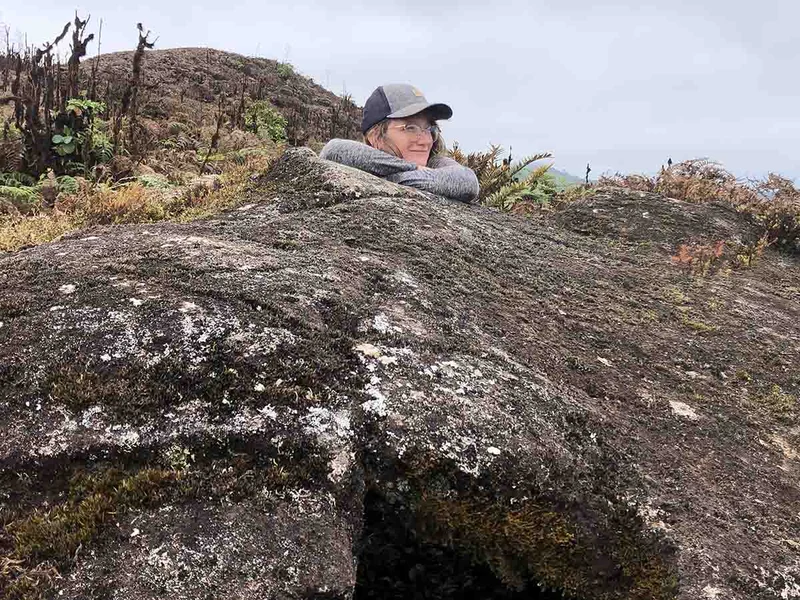
El Chato Giant Tortoise Reserve: How to make the most of your visit | Travel Blog
One of the greatest attractions of The Galapagos Islands are the Galapagos Tortoises. This is because you won’t find a giant, peaceful, and impossibly-old tortoise like this anywhere else in the Americas. These gentle giants seem like something straight out of ancient history, and in fact, best estimates say that they have been on the archipelago for 2-3 million years. Now, if you go to the Islands, you will learn all about their history, their struggles, and the various efforts towards their conservation on Santa Cruz and other islands across Galapagos National Park. Travelers come from far and wide just to see Giant Tortoises, and I don’t blame them. Many people will see their first tortoise in the Charles Darwin Station, but there is a place where you can easily see them roaming free, munching on grass, and ready to pose for photos. This place is El Chato Tortoise Reserve
Table of content
- Where Can You See The Galapagos Giant Tortoise in the Wild?
- El Chato Galapagos Tortoise reserve in the Highlands of Santa Cruz Island
- Where is El Chato Tortoise Reserve?
- My Visit to the Santa Cruz Highlands to see the Giant Tortoises at El Chato Reserve
- How to get to El Chato Tortoise Reserve From Puerto Ayora?
- Frequently Asked Questions about visiting El Chato Reserve
- How much is the Entrance fee to El Chato Reserve?
- Do you need to book El Chato entrance tickets in advance?
- What time does El Chato open?
- What else can you see apart from Giant Galapagos Tortoises at El Chato?
- How much time should you take to visit the Tortoises at El Chato and the Lava Tunnels?
- Are there other Giant Tortoise Ranches in the highlands of Santa Cruz Island?
- Conclusion
Where Can You See The Galapagos Giant Tortoise in the Wild?
The people of The Galapagos are making an incredible effort to help conserve the Galapagos tortoise, which makes it easy to go and see them in one of the various tortoise breeding centers across the different islands, but the real magic happens when you see a tortoise in the wild.
One of the best places you can see a tortoise roaming free on Santa Cruz Island is at El Chato Tortoise Reserve. This private reserve is an area that was set aside for cattle ranching and soon became a gathering spot for many, many tortoises. The owners seized this opportunity to be able to help protect tortoises and turned their land into a home for free-roaming tortoises, and a lovely attraction for travelers. Though the landscape at El Chato is a bit more green and luscious than where you would naturally find a tortoise, they are very happy here as they have plenty to eat.

El Chato Galapagos Tortoise reserve in the Highlands of Santa Cruz Island
El Chato is a well-known destination for a reason. Set up with great trails, a lovely restaurant, lava tunnels, and home to a number of free-roaming giant tortoises, this 12-hectare reserve is a great way to spend a morning or afternoon.
The main attraction is of course the tortoises that you will find all around the property. Each tortoise at El Chato Ranch is truly a wild Galapagos Tortoise, but they like to congregate here because it is like an all-out buffet compared to their true natural habitat. You see, tortoises love cattle ranches where they can eat plenty of plants on the cultivated pasture land. This is a much easier life than foraging in the rough hills among laval rock. Especially in the dry season when food availability is low. Here in El Chato, the owners have allowed the tortoises to totally take over, and it is incredible to see.
Where is El Chato Tortoise Reserve?
El Chato is found on Santa Cruz Island in the highlands - an often underappreciated region of Galapagos National Park.
This little private reserve is found 2 km south of Santa Rosa, which is a smaller town found in the South-East corner of the Santa Cruz Highlands. It takes about 30-45 minutes to get to El Chato in car from Puerto Ayora, It is easy to get a taxi there by asking for El Chato Tortoise Reserve, or El Chato Ranch, since as I mentioned before it is one of the most popular places to see the galapagos tortoises in the wild.

My Visit to the Santa Cruz Highlands to see the Giant Tortoises at El Chato Reserve
The second time I visited Puerto Ayora I knew that the best way to visit El Chato was by going directly from the airport, so, after landing, taking the bus and a ferry, my friend and I got in a taxi and asked the driver to take us to Los Gemelos and El Chato Tortoise Reserve before heading to our hotel.
Los Gemelos is an incredibly large pair of volcanic craters - Los Gemelos meaning “the twins” - that have since filled with lush vegetation and are now bursting with life. The size of the crater is honestly awe-inspiring. We walked along the trail there, enjoying the unique flora of Santa Cruz, and went back to the taxi. Next up, my friend’s first wild tortoise.
We arrived at El Chato Ranch, paid our $10 per person, and were assigned a guide. Our guide walked us through the lava tunnels, which are amazing no matter how many times you enter one, and around the property. He stopped to let us take photos of tortoises and birds while he told us all about the wildlife and the history here. I definitely got some of my best tortoise photos here as they are so relaxed and the background is really beautiful. I do recommend good shoes as there are some muddy paths you will have to walk on.
Among the giant tortoises we saw Yellow Warblers, Cattle Egrets, and a glimpse of a very fast Vermillion Flycatcher. Also, we got incredibly lucky and saw a Galapagos Crake near one of the ponds! After our 45 minute tour, us in total awe of these gentle giants roaming around this little tortoise paradise, we enjoyed a delicious coffee and took silly photos with the giant tortoise shells that are on display. Overall, it was the perfect way to start our trip.
How to get to El Chato Tortoise Reserve From Puerto Ayora?
Find a taxi in Puerto Ayora and ask them to take you to El Chato Tortoise Reserve. You should also visit Los Gemelos which is very close by. The ride should take about 30-45 minutes one way.
Another great option is going straight from the airport. If you come in on an earlier flight, ask your driver to take you to El Chato Reserve and Los Gemelos before heading to your hotel in Puerto Ayora. Our driver charged us $40 to stop at Los Gemelos, El Chato, and take us to our hotel afterwards. This does not include the entrance fee for El Chato.
Last, you can rent a bike and cycle there. However, you need to be in good shape to do this as the hill up to the reserve from the coast is quite long! It is also recommended to go early to avoid biking up the hill in the hot sun!
Frequently Asked Questions about visiting El Chato Reserve
How much is the Entrance fee to El Chato Reserve?
The entrance fee is $10 USD per person and includes a guide. You should consider having cash to leave your guide a tip.
Do you need to book El Chato entrance tickets in advance?
No. This is one of the places in Galapagos National Park where you do not need reservations or tickets ahead of time.
What time does El Chato open?
El Chato is open from 8 AM–5:30 PM 7 days a week.
What else can you see apart from Giant Galapagos Tortoises at El Chato?
You can explore lava tunnels and see many bird species, such as cattle egrets, finches, magpies, flycatchers and if you are lucky a Galapagos Crake!
You can also see shells from real giant tortoises that have died from natural causes long ago. You can even get a photo inside a shell!
There is also an alternate trail to Cerro Chato if you have time. This offers a beautiful view of the area around El Chato Reserve. However, most people stick around “La Caseta” so you might have to ask specifically if you can go here,
How much time should you take to visit the Tortoises at El Chato and the Lava Tunnels?
This is a good morning or afternoon activity on Santa Cruz. You only need around 2-2.5 hours in total to do the tour, see a tortoise (or many!), explore the lava tunnels, enjoy some coffee, and get some great photos. The guided tour is about 45 minutes. Also remember to include about 2 hours for travel if going to and from Puerto Ayora.
Are there other Giant Tortoise Ranches in the highlands of Santa Cruz Island?
Technically, tortoises can be found in pretty much any space where there are cattle, because they love pastureland, but these of course are not open to visitors. In terms of formal places to see a tortoise in the wild, Santa Cruz has El Chato Reserve as well as the Giant Tortoise Reserve - aka Rancho Primicias. Rancho Primicias is essentially right beside El Chato and similarly has lava tunnels, wild tortoises, coffee, birds to observe, walking trails, and a restaurant. They both come well-recommended, so you will have to simply decide which one seems better to you. If you have lots of time, you could also go to both El Chato and The Giant Tortoise Reserve!
In my case, on both my visits to Santa Cruz I have only ever visited El Chato Ranch, and I have loved it both times, so I can personally recommend it as a great option to see a wild tortoise!
Conclusion
El Chato Tortoise Reserve is a great way to spend your morning or afternoon on Santa Cruz. This is an awesome place to see a giant tortoise in the wild and learn more about the island and its history. It is also an easy tour to do because you do not need to book ahead of time and it is very affordable.
Check Our Galapagos Cruises:

Kirstynn Joseph is a biologist, science communicator, and freelance writer who loves a good adventure, especially if it makes for a great story. She is from Canada and has lived in Ecuador for 5 years. She loves being outside and travels as much as she can, especially to places with great hikes and interesting wildlife. You can follow her adventures on Instagram!

